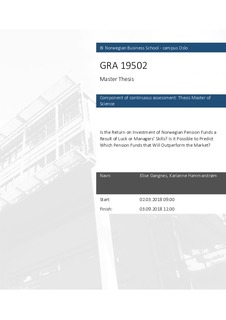Is the Return on Investment of Norwegian Pension Funds a Result of Luck or Managers’ Skills? Is it Possible to Predict Which Pension Funds that Will Outperform the Market?
Master thesis
Permanent lenke
http://hdl.handle.net/11250/2578445Utgivelsesdato
2018Metadata
Vis full innførselSamlinger
- Master of Science [1621]
Sammendrag
The purpose of this research is to get insight into the Norwegian pension fund
market. We will look further into the performance of pension funds by analyzing
the drivers of the return of the funds. The data of study consists of 70 Norwegian
pension funds delivered from Pensjon Norge AS with period from 2014-2017.
In this thesis, we will study whether the performance of the pension funds is a result
of luck or the stock-picking skills of managers by using bootstrap simulations. In
addition, we will investigate the persistence of pension fund performance. Firstly,
we use the four-factor model of Carhart (1997) to compute residuals, factor loadings
and alphas of each pension fund. Further, we bootstrap a new dataset of alphas, and
generate t-statistics of alpha, for each fund which is used to compare with the
original four-factor alphas and t-statistics of alpha. We also compute the parametric
and bootstrapped p-values for each fund to conclude our hypotheses. The main
analysis in this study is over a period of three years (2015-2017). Besides, we also
test three different subperiods as robustness tests. We operate with two different
datasets, one dataset which contains gross numbers while the other dataset is net
numbers.
Our main findings in this analysis are that there is some degree of stock-picking
skills of managers for several pension funds. By evaluating the bootstrapped pvalues,
we can reject the null hypothesis for significant p-values and hence, rule the
return of some funds as a result of managers’ skills. On the contrary, we are not
able to make any conclusions if the bootstrapped p-values are insignificant. In
general, there are indications of some persistence in the performance of the pension
funds. However, we are not able to predict which pension fund that will outperform
the market since the ranking of the funds varies across the percentiles.
Beskrivelse
Masteroppgave(MSc) in Master of Science in Business, Business law, tax and accounting - Handelshøyskolen BI, 2018
